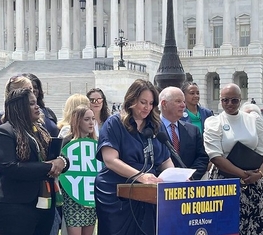Citizens Project v. Colorado Springs
Case Summary
LWV Pikes Peak Region and partners sued the city of Colorado Springs for holding its municipal elections in April during odd-numbered years. Hispanic and Black voter turnout is often much lower in these elections. Plaintiffs argued that the unusual timing of these elections violated Section 2 of the Voting Rights Act.
In most Colorado municipalities, like presidential and statewide races, local elections are held in November. Of Colorado’s 25 largest municipalities, Colorado Springs is one of only three municipalities that does not hold its local elections in November. The city currently holds its local elections—including races for city council and mayor—on “the first Tuesday in April in each odd-numbered year.”
On June 1, 2022, the League of Women Voters of the Pikes Peak Region (“LWV Pikes Peak Region”), Citizens Project, Colorado Latinos Vote, and the Black/Latino Leadership Coalition filed a lawsuit in federal court, arguing that Colorado Springs violated Section 2 of the Voting Rights Act by holding April odd-numbered year municipal elections.
Section 2 states that, “No voting qualification or prerequisite to voting or standard, practice, or procedure shall be imposed or applied by any State or political subdivision in a manner which results in a denial or abridgment of the right of any citizen of the United States to vote on account of race or color.”
Plaintiffs seeking to prove a Section 2 claim must prove that, based upon the totality of circumstances, “political processes leading to nomination or election in the State or political subdivision” are not equally open to non-white populations, preventing them from equally participating in the political process and electing candidates of their choice.
Courts employ a two-part test and several factors to consider whether a voting process like election timing violates Section 2. First, a political process must have a disparate racial impact on populations of color. Second, the disparate racial impact must be linked to social and historical conditions of discrimination. Other factors used to prove a Section 2 violation under the totality of the circumstances include the use of at-large elections and majority vote requirements, the extent to which minority candidates have won elections in the jurisdiction, the degree to which elected officials are unresponsive to the concerns of the minority group, the size of any disparate impact caused by a challenged practice[…] and the degree to which the practice serves important state interests.
LWV Pikes Peak Region and its partners argued that the timing of Colorado Springs’ municipal elections met these requirements in several ways. First, the plaintiffs pointed to the substantial disparity in turnout, with white voters voting at double the rate of non-white voters during the April elections. This disparity was far less during the November elections. The city’s government was also unrepresentative, with only one non-white member of the city council and over 84% of the members of appointed city boards and commissions being white at the time of filing. Over the past decade, 32 of the 34 successful candidates for City Council were white. The plaintiffs also pointed to the long history of the city being unresponsive to concerns of persons of color and large disparities in health, education, and income between the white population and the non-white population. Given these facts, the plaintiffs asserted that the April timing of municipal elections rendered them not equally open to voters of all races.
The League is represented in this matter by the Harvard Law School Election Law Clinic.
LWV Timeline
LWV Pikes Peak Region and partners file lawsuit.
LWV Pikes Peak Region and Citizens Project, a local democracy and voting rights group, file a complaint in federal court arguing the timing of local elections in Colorado Springs discriminates against voters of color in violation of Section 2 of the Voting Rights Act.





